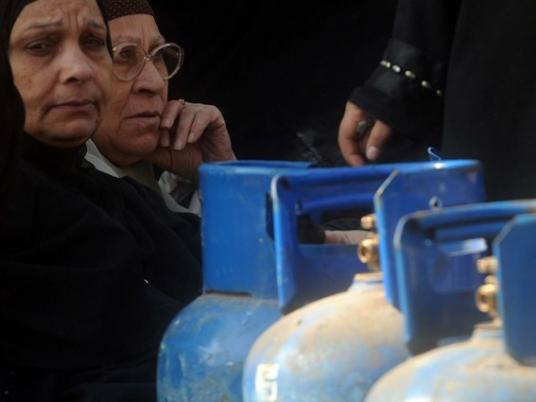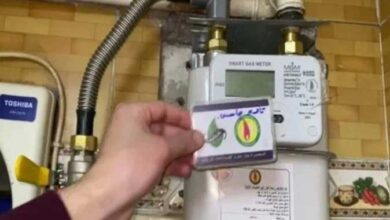
The simple act of turning on a stove can mean two very different things for Egyptian families.
In one case, the turn of a stove knob ignites a stream of Egyptian-made natural gas from a pipe, giving forth a steady blue flame. In another, a knob on an imported butane, or liquefied petroleum gas, canister, connected to the stove by a tube, is turned and a burner is lit with a lighter or match.
Both flames make equally good tea. But in terms of costs, production and the policies behind them, they couldn’t be more different.
In the first case, residents are linked to the national gas grid, through which they are taking advantage of one of Egypt’s most valuable resources at a government-subsidized price. Their gas bill likely amounts to anywhere from LE7–15 per month.
In the second, cooks who fire up stoves from butane cylinders are paying for the costs of weak energy infrastructure, ineffective subsidy policies and international export agreements. They can pay anywhere from LE8–50 for a cylinder, because frequent shortages lead to price rises. A family might use two to three cylinders a month. Around three-quarters of Egyptians use butane cylinders.
The reasons for this inequality, Egypt Independent has discovered, lie in outdated, self-defeating government policies that have failed to keep up with a rapidly changing industry and growing domestic need.
Meeting electricity needs
Since gas was first discovered beneath Egyptian soil in the 1960s, demand for the clean-burning fuel has steadily grown, as both international and domestic markets continue to develop an ever-increasing hunger for energy. The average Egyptian’s electricity use more than doubled between 1991 and 2009, according to World Bank data.
Originally fueled by oil, most power stations have been converted to run on natural gas. Sixteen percent of the country’s energy is derived from the Aswan dam, while 84 percent is derived from natural gas, according to MBendi information services, a South Africa-based business research service.
Though most of the country’s power stations are operated by seven state-owned energy companies, there are several privately owned plants in operation or under construction. One, run by US-based InterGen — a joint venture of Bechtel Enterprises and Shell Generating Limited — is a steam plant run on gas. It is able to offer cheap electricity thanks to government supplied natural gas at a subsidized price.
On paper, it seems that Egypt has enough reserves to meet these rapidly expanding needs, for now at least.
According to the US Energy Information Administration, an independent research body, Egypt produced 2.3 trillion cubic feet in 2009, and consumed roughly 1.6 trillion cubic feet in the same year.
But mass power outages in 2009 and 2010, which left large portions of Cairo in the dark for anywhere between 20 minutes and several hours during the sweltering August heat and in the fasting month of Ramadan, suggest that the reality is more complex.
From the ground to the nation’s stoves
Beginning under former President Gamal Abdel Nasser, the practice of subsidizing essential goods, like butane and natural gas, was meant to help Egypt’s poor move into the middle class. Part of a broad policy that Nasser claimed would propel the economy forward, their effect has been to keep prices artificially low, at the substantial expense of the government.
From 2007 onward, energy subsidies have accounted for 70 percent of all government subsidies, costing the government an estimated US$15.7 billion last year. According to figures provided by the Egyptian Center for Economic Studies, natural gas accounts for 24 percent of energy subsidies, along with fuel oil, which is used to top up electricity generation in natural gas plants. Butane accounts for 14 percent.
This is why the Petroleum Ministry has found itself over $140 billion in debt, says Magdi Nasrallah, professor and founder of the Department of Petroleum and Energy Engineering at the American University of Cairo.
Once implemented, subsidies are not easily lifted. Different elements of the subsidy program target distinct interest groups within society.
Much of the subsidized electricity has historically gone to support manufacturers in energy-intensive industries, many of whom were associated with former President Hosni Mubarak’s National Democratic Party. Cement, fertilizer and other heavy industries, which all happen to be large polluters, benefit from artificially cheap fuel and sell their products at international prices. They see huge profit margins, but for the average worker or consumer, the appeal is less clear.
Meanwhile, subsidies for domestic electricity and butane gas address more popular concerns. When Nasser’s successor Anwar Sadat tried to liberalize the economy in 1977 and remove bread subsidies at the request of the World Bank and International Monetary Fund, riots ensued.
Since then, discussion of lifting subsidies has been politically prohibitive, despite economists’ insistence that they warp the local economy. It’s a policy that can’t continue much longer, Nasrallah says. “The subsidy program has been a big failure,” he says, shaking his head.
The government can sell natural gas within its own borders at a loss, or abroad for profit. So supplying the local market has become its least attractive option in financial terms.
“Electricity companies use this resource at a subsidized rate, so the government has not been giving them the amount they need, because of more profitable demand elsewhere, such as export markets,” Nasrallah said, explaining the power cuts.
He added that butane cylinders are imported from Algeria at LE60–65 and sold back to homes at LE20–30, highlighting both the infrastructural weakness of not connecting homes to the natural gas grid and the costliness of the import and subsidies program.
Subsidies are also not targeted to those who need it most.
“Petroleum and natural gas subsidies to individuals and households benefit all consumers, whether rich or poor,” Hakim Darbouche and Robert Mabro wrote in their study on Egypt’s natural gas market, published last year by the Oxford Institute for Energy Studies.
They estimated that Egypt could save more than $1 billion just by phasing out the use of butane in homes, the price of which has skyrocketed on international markets in recent years.
But costly infrastructure changes allowing gas to be piped into all homes would imply a short-term rise in prices that most poor families cannot shoulder, despite government incentives.
The lack of appropriate infrastructure means that it is vastly more profitable for the government to export gas, rather than sell it domestically, as the case with supplying electricity companies demonstrates.
Substantial natural gas reserves have placed Egypt in the top tier of international energy producers. In 2009, Egypt was the 13th largest exporter of natural gas in the world.
“We’re not effectively using the produced gas, so why not export and at least get some hard currency?” asked Nasrallah.
This line of thinking is one of the motivating reasons behind some of the country’s most controversial international export deals, which send gas to Europe and Israel.
This piece was originally published in Egypt Independent's weekly print edition.




